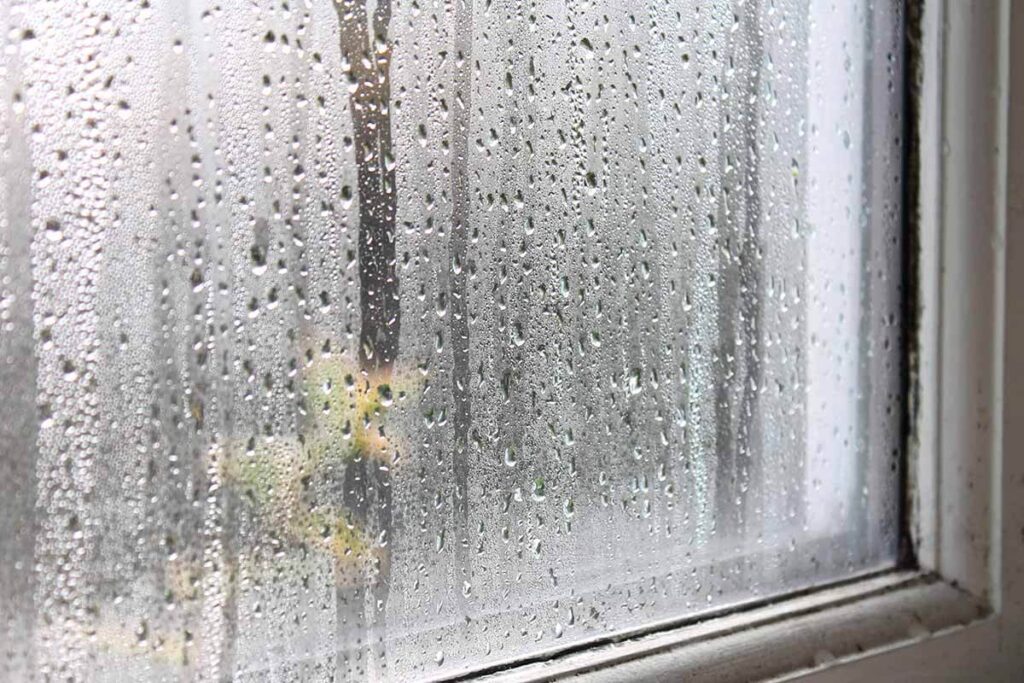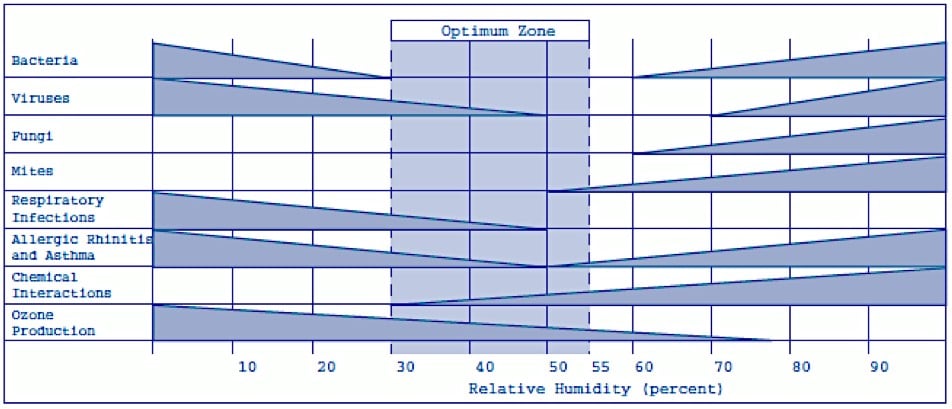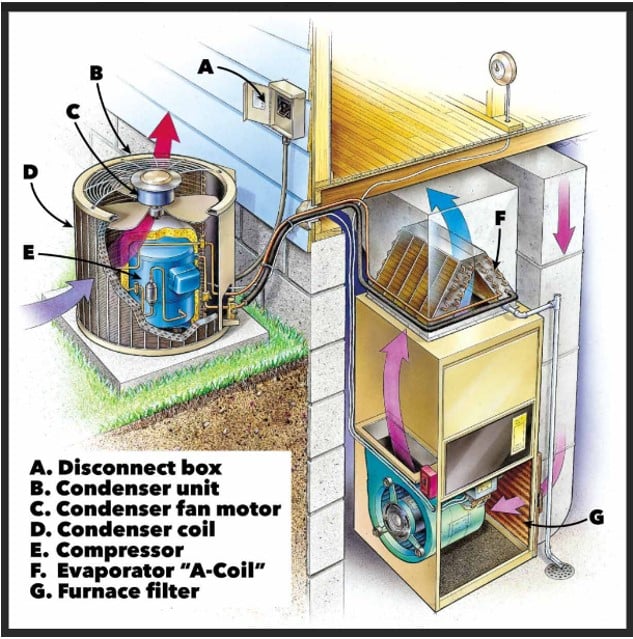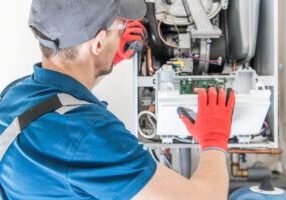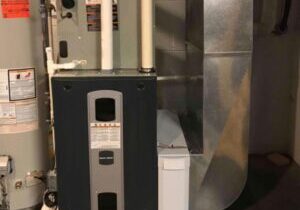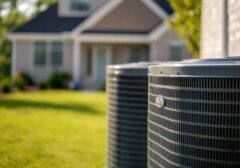Taking the proper precautions today will keep the humidity away.
June 2023 delivered humidity indexes upwards of 90% to Southwestern Pennsylvania, but that’s nothing new. In fact, over the past decade, we’ve dealt with record-breaking amounts of precipitation accompanied by high levels of humidity – leaving us feeling constantly sticky, uncomfortable, and fatigued – even within our air-conditioned home.
During the summer months at Spurk HVAC, we’re sometimes asked why someone’s home feels so humid, even though they’re running their air conditioning constantly and at full-blast. Somewhere along the way, people got it in their heads that the use of air conditioning = no humidity. Well, that isn’t the case.
There are a handful of reasons why your home has high humidity, and finding the root cause is the key to eradicating the issue. In this article, I break down what is considered a “humid home,” the usual suspects that cause household humidity, and how to optimize your AC system to help reduce home humidity levels.
How can I tell if my home is too humid?
According to the Mayo Clinic, the ideal indoor relative humidity should be between 30 and 60 percent – anything exceeding 50% is considered high and when you have high humidity in a home, it could lead to a range of home and health problems.
High humidity in your home can cause your:
- floors to shrink, warp, and buckle.
- painted walls and ceilings to discolor, bubble, peel, and mold.
- furniture to rot and decay.
- electronics to corrode and malfunction.
High humidity can cause moderate to severe health issues such as:
- Discomfort, low energy, dehydration, fatigue, and muscle cramps.
- Exposure to airborne pollutants such as allergens, mold, mildew, and viruses.
Common signs of high humidity can be noticed through the musty smell that arises when your air is on, a wet feeling on the surface of your skin, and condensation forming on your windows, toilet tanks, and pipes. There are a range of culprits responsible for humidity in your home and the solutions can range in cost and complexity.
What causes humidity in your home?
There are a number of factors that can play into your home holding excess moisture and once you pinpoint the main culprits, you can start resolving issues that could otherwise become costly problems.
-
Climate and everyday activities
Chances are, if you live in a humid area, it’s more likely that your home will absorb the muggy environment. Pennsylvania, for example, has a humidity percentage of 78% ranking them as the 21st most humid state in the US. That high level of air moisture outside can directly affect your home’s interior by seeping through windows, doors, and other crevices.
Even simple activities within your home such as showering, cooking, and running the dishwasher can add more water vapor into the air and if there isn’t proper ventilation to combat that moisture, problems can arise even with an efficient furnace running.
-
Poor insulation
There can be a variety of reasons why your home’s insulation might not be doing its job. Whether it’s older or just poorly insulated, damp air can push its way inside through unsealed gaps. This also means that cool, air-conditioned air can escape outside through those same gaps instead of circulating indoors. So, while it seems that your air-conditioner isn’t doing its job, it’s actually working overtime to do its job better (and driving up your energy bill in the process!😬).
-
Moisture under your foundation
If you’re having trouble pinpointing the problem, you may very well be sitting on it. When it rains, soil soaks up water like a sponge and when it rains a lot, like in Pittsburgh, that water may be sitting close to your foundation for longer than you’d like. The process called rising damp combined with ineffective grading, can be a significant factor as to why rainwater can accumulate at your home’s foundation. This is commonly seen in homes with basements. Basements can be especially humid if they are poorly insulated and don’t have windows. Ultimately, this can really compound the issues.
-
Evaporator coil issues
In our experience, many times the humidity can be resolved with a quick fix to your air-conditioning unit. An evaporator coil is the part of the air-conditioner that collects the heat from the air in your house. The refrigerant inside the coil absorbs the heat and then carries it outside where it is released into the outdoor air. With an efficient coil, this process continues until it does its job and the desired temperature is reached.
If, however, you think there is an issue, you can check by simply looking for water or ice around the unit. If there is, the coil will need to be replaced. Unless you know exactly what to do, it’s best to seek the service of an experienced professional to swap out the part.
-
Air conditioning unit may be too large
Many people are unaware that air-conditioning isn’t a one-size-fits-all product and when it comes to AC performance, size really does matter. When a unit is too big, the air cools off quicker than the system can dehumidify the space. On the other hand, if a unit is too small, it won’t be able to remove all of the moisture causing humidity levels to rise anyway. This leads to an uncomfortable home, high energy bills, and an inefficient system.
How can I reduce the humidity in my home?
There are plenty of ways to resolve your humidity troubles without breaking the bank. Whether you’re looking to invest in a new, more efficient system, or just try to resolve the issue with a quick fix with your current one, there are plenty of options out there.
1. Ensure your air conditioning system is the right size.
Before purchasing your and installing your AC unit, it’s important to have an expert come out to measure the space and fit your house for the most efficient unit. By finding the right size air conditioner, you can efficiently cool your home and save on your energy bill as well – money in the bank!
TABLE: Find the Right Air Conditioner for Your Room Size |
||||||
|---|---|---|---|---|---|---|
| Room Area in Sq. Ft | Recommended BTU | Mostly Shade | Full Sun | Kitchen | 3 Regular Occupants | 4 Regular Occupants |
| 150 | 5000 | 4500 | 5500 | 9000 | 5600 | 6200 |
| 250 | 6000 | 5400 | 6600 | 10000 | 6600 | 7200 |
| 350 | 8000 | 7200 | 8800 | 12000 | 8600 | 9200 |
| 450 | 10000 | 9000 | 11000 | 14000 | 10600 | 11200 |
| 550 | 12000 | 10800 | 13200 | 16000 | 12600 | 13200 |
| 850 | 15000 | 13500 | 16500 | 19000 | 15600 | 16200 |
| 1000 | 18000 | 16200 | 19800 | 22000 | 18600 | 19600 |
| 1500 | 24500 | 22050 | 26950 | 28500 | 25100 | 25700 |
2. Consider an air conditioner with enhanced dehumidification features.
There are some clever ducted and split air system air conditioning units that offer the latest cutting-edge technology. Now, instead of just heating and cooling your home, you can have the option of humidifying, dehumidifying, ventilating, and purifying the air. With some systems, you can even adjust your home’s humid environment from the comfort of your couch with just a touch of a button on a user-friendly remote control.
3. Think about investing in a high-capacity ducted dehumidifier.
Even the best air-conditioning units can struggle to keep humidity out on a cloudy, rainy day. The truth is, sometimes the humidity can send signals to your thermostat that your home is hot when it really isn’t. This creates unnecessary wear and tear on your system. To resolve that problem, you can explore a variety of high-efficiency, high-capacity dehumidifiers on the market that will supplement your air conditioning system when it’s not necessarily hot, but just humid instead.
4. Use exhaust fans when showering.
Stop the spread of humidity at its source and utilize those exhaust fans before it spreads throughout the house.
5. Install high-efficiency air filters and regularly clean the indoor coil and drain pan.
Take a proactive approach and ensure your system is checked regularly. Sometimes something as simple as swapping out a dirty air filter is all your unit needs to reset. Regular maintenance is essential to controlling mold growth in your duct system.
6. Seal excessive air leaks.
Though some houses are very airtight and clearly need improved ventilation, most others are too leaky. By detecting leaky windows, poorly insulated rooms, and gaps in doors and ductwork, you can take a proactive approach to sealing those areas to keep that moisture out.
7. Consider running the fan to circulate air through your home.
Sometimes the best solutions are the easiest. By moving stagnant air through your home, and cracking windows for added ventilation, you could successfully cut out the damp feeling and enjoy some fresh air in the process.
Conclusion
Humidity is not just uncomfortable but can be very dangerous to your health and damaging to your home. Understanding the factors that contribute to humidity and resolving those issues at the source, is crucial to your well-being, especially children, seniors, and pets.
If you would like assistance with assessing the air quality and adjusting the humidity levels in your home, we can help! Contact Spurk HVAC to schedule an in-home humidity analysis, and receive guidance from one of our expert team members today.



